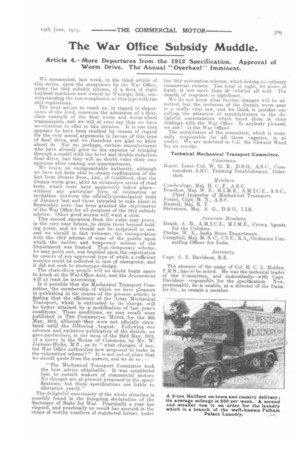The War Office Subsidy Muddle.
Page 21

If you've noticed an error in this article please click here to report it so we can fix it.
Article 4.—More Departures from the 1912 Specification. Approval of Worm Drive. The Annual "Overhaul" Imminent.
We commented, last week, in the third article of this series, upon the acceptance by the War Office, under the 1912 subsidy scheme, of a fleet of eight Leyland machines now owned by Warings, Ltd., notwithstanding the non-compliance of this type with the 1912 regulations.
The next advice to reach us, in regard to departures of the kind, 'concerns the admission of a firstclass example of the final worm and worm-wheel transmission, and we will at once say that we have no objection to offer to this decision. It is one that appears to have been reached by reason of regard for the very sound arguments in favour of this type of final drive, and we therefore are glad to know about it. Not so, perhaps, certain manufacturers who have already gone to the expense of bringing through a model with the bevel and double-reduction final drive, but they will no doubt voice their own opinions after reading our announcement..
We learn, on unimpeachable authority, although we have not been able to obtain confirmation of the fact from Dennis Bros., Ltd., of Guildford, that the Dennis worm gear, after an exhaustive series of road tests, which tests have apparently taken place— without any particular form of intimation or invitation--between the officially-promulgated tests of January last and those intended to take place in September next—has been granted the imprimatur of the War Office for all purposes of the 1912 subsidy scheme. Other good worms will want a turn.
This second exception from the rules may prove, in the very near future, to strain them beyond holding point, and we should not be surprised to see, and we should in fact welcome, the incorporation with the 1912 scheme of some of the points upon which the earlier and temporary scheme of the Department was framed. That temporary scheme, we may point out, was founded upon the registration by owners of any approved type of which a sufficient number could be collected in case of emergency, and it did not aeek to stereotype design.
The chain-drive people will no doubt begin again to knock at the War-Office door, and the denouement will at least be interesting.
Is it possible that the Mechanical Transport Committee, the membership of which we have pleasure in publishing in the course of the present article, is finding that the efficiency of the Army Mechanical Transport, which is entrusted to its charge, will be better attained by a, modification of last year's conditions. Those conditions, we may recall, were published in THE COMMERCIAL Moron for the 9th May, 1912, although they were not officially circulated until the following August. Following our advance and exclusive publication of the details, we gave particulars, in our issue of the 23rd May, 1912, of a query in the House of Commons, by Mr. W. Joynson-Hicks, M.P., as to "what changes, if any, the War Office authorities now proposed to make in the subvention scheme ? " it is not out of place that we should quote from the answer, and we do so :—
"The Mechanical Transport Committee took the best advice obtainable. It was considered best. to consult makers of commercial motors. No changes are at present proposed in the specifications, but these specifications are liable to alteration yearly."
The delightful uncertainty of the whole situation is possibly found in the foregoing declaration of the Secretary of State for War. Practically a year has elapsed, and practically no result has accrued in the 'shape of worthy numbers of registered lorries, under the 1912 subvention scheme, which belong to ordinary commercial owners. The total in sight, let alone in hand, is not more than 20 vehicles all told. The dearth of response is significant.
We do not know what further changes will be admitted, but the inclusion of the Dennis worm gear is a really vital one, and we think it justifies our calling the attention of manufacturers to the delightful uncertainties which beset them in their dealings with the War Office. Is anybody pleased, we ask I Is the War Office ?
The constitution of the committee, which is nominally responsible for all these vagaries, is as under. lire are indebted to Col. Sir Edward Ward for its receipt.
Technical Mechanical Transport Committee,
Chairman.
Boyce, Lieut.-Col. W. G. B., D.S.O., A.S.C., Commandant A.S.C. Training Establishment, Aldershot.
Members.
Cumberlege, Maj. H. C. F., A.S.C.
Donohue, -Maj. W. E., M.I.M.E., A.M.I.C.E., A.S.C., Chief Inspector of Mechanical Transport. Foster, Capt. H. N., A.S.C.
Russell, Maj. R. T.
Stevenson, Maj. A. G., D.S.O.,
Associate Members.
Heath, A. M., A.M.I.C.E., M.I.M.E., Crown Agents for the Colonies.
Phelps, W. E., India Store Department. Campbell, Maj. M. S. C., C.I.E., R.A„ Ordnance Consulfing Officer for India.
Secretary.
Capt. A. E. Davidson, R.E.
The absence' of the name of Col. H. C. L. Holden, F.R.S., has to be noted. He was the technical leader of the Committee, and undoubtedly—with Capt. Davidsonresponsible for the specification. Now, presumably, he is unable, as a director of the Daimler Co., to remain a member.




























